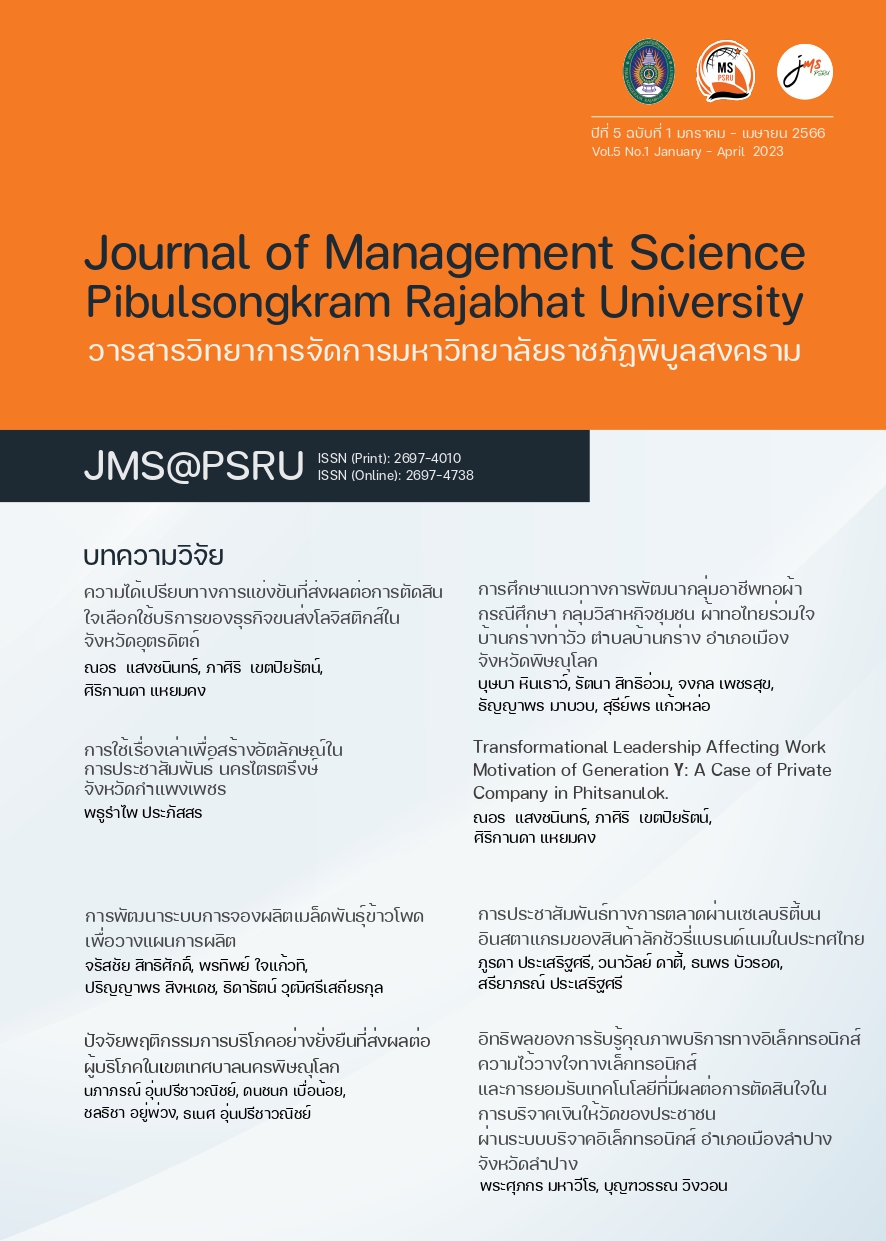The Competitive Advantages Affecting the Purchase Decision of Transportation and Logistics Business in Uttaradit Province
Keywords:
Competitive advantage, Decision Making, logistic business in Uttaradit provinceAbstract
The objective of this research is to study the importance of competitive advantage and Decision making and competitive advantages that affect the decision to choose the service of the transportation business Logistics in Uttaradit Province The population is people who have used the services of logistics transportation business in Uttaradit province. The sample consisted of 385 people by simple random sampling. The research instrument was a questionnaire. The statistics used for data analysis were frequency, percentage, mean, standard deviation and multiple regression analysis. The results of the research revealed that it was at the highest level in all aspects. When considering each aspect, it was found that the quick response It is at the highest level, followed by differentiation. and cost leadership respectively. It was at the highest level, followed by the behavior after purchase. and perception of needs, respectively. The results of the research hypothesis testing revealed that all independent variables influenced the decision to use the service. statistically significant at the 0.01 level, 2 variables were focused on specific parts; Cost Leadership The part of making a difference and fast response There was a statistical significance at the 0.05 level explaining the variability of competitive advantage that influenced the decision to use the service by 55.50% (R2 = 0.555).
References
จิดาภา ง่วนเฮงเส็ง และจิราภรณ์ ขันทอง. (2561). กลยุทธ์การพัฒนาการได้เปรียบทางการแข่งขันของธุรกิจขนส่งสินค้าทางถนนภาคตะวันออกเฉียงเหนือตอนล่าง. Journal of Nakhonratchasima College, 12(2), 126 – 137.
จันทร์เพ็ญ วรรณารักษ์, วิชิต อู่อ้น และกัลยารัตน์ ธีระธนชัยกุล. (2560). แบบจำลองความได้เปรียบในการแข่งขันของธุรกิจขนส่งและโลจิสติกส์ในประเทศไทย. วารสารการประชุมวิชาการระดับชาติ “นวัตกรรมและเทคโนโลยีวิชาการ 2017”, 2, 138-149.
ไทยโพสต์. (2564). อีคอมเมิร์ซไทยปี 2564 มูลค่าพุ่งสูงแตะ 4 ล้านล้านบาท. สืบค้น 25 พฤศจิกายน 2564, จาก https://www.thaipost.net/main/detail/119707
นิตยา สุภาภรณ์. (2564). ความสามารถและความได้เปรียบทางการแข่งขันของผู้ประกอบการวิสาหกิจขนาดกลางและขนาดย่อม (SMEs) ในจังหวัดนนทบุรี. วารสารวิชาการวิทยาลัยสันตพล, 7(2), 43 – 52.
ประยงค์ มีใจซื่อ. (2558). การจัดการเชิงกลยุทธ์. กรุงเทพฯ: มหาวิทยาลัยรามคำแหง.
เรวัตร์ ชาตรีวิศิษฏ์. (2554). การจัดการเชิงกลยุทธ์ (พิมพ์ครั้งที่2). กรุงเทพฯ: พิมพ์ดีการพิมพ์.
วสุธิดา นักเกษม และประสพชัย พสุนนท์. (2561). ปัจจัยที่ส่งผลต่อการสร้างความได้เปรียบทางการแข่งขันของผู้ประกอบการธุรกิจบริการ ในเขตกรุงเทพมหานคร. Veridian E-Journal, Silpakorn University, 11(1), 2148 – 2167.
ศิริวรรณ เสรีรัตน์, สมชาย หิญกิตติ, องอาจ ปทะวานิช, รังสรรค์ ประเสริฐศรี, ลัทธิกาล ศรีวะรมย์,
จิรศักดิ์ จิยะจันทน์, ชวลิต และพรพิมล วิริยะกุล. (2546). การจัดการเชิงกลยุทธ์และกรณีศึกษา. กรุงเทพฯ: Diamond In Business World.
สมยศ นาวีการ. (2551). การบริหารเชิงกลยุทธ์ (ฉบับปรับปรุงครั้งที่ 3). กรุงเทพฯ: สํานักพิมพ์บรรณกิจ 1991.
Blackwell, R., Miniard, P., & Engel, J. (2006). Consumer behavior (10th ed.). New York: Thomson South-Western.
Cochran, W.G. (1963). Sampling Techniques. New York: John Wiley & Sons. Inc.
Kotler, P. (2003). Marketing management (11th ed.). Upper Saddle River, NJ: Prentice- hall.
Nunnally, J. C. B., I.H. (1994). The Assessment of Reliability. Psychometric Theory, 3, 248-292.
Porter, M. E., & Millar, V. E. (1985). How information gives you competitive advantage: Harvard Business Review, Reprint Service.
Porter, M.E. (1985). Competitive Advantage. New York: Free Press.
Downloads
Published
How to Cite
Issue
Section
License
Copyright (c) 2023 Pibulsongkram Rajabhat University

This work is licensed under a Creative Commons Attribution-NonCommercial-NoDerivatives 4.0 International License.
บทความที่ได้รับการตีพิมพ์ในวารสารวิทยาการจัดการมหาวิทยาลัยราชภัฏพิบูลสงคราม เป็นลิขสิทธิ์ของมหาวิทยาลัยราชภัฎพิบูลสงคราม
บทความที่ลงพิมพ์ใน วารสารวิทยาการจัดการมหาวิทยาลัยราชภัฎพิบูลสงคราม ถือว่าเป็นความเห็นส่วนตัวของผู้เขียนคณะบรรณาธิการไม่จำเป็นต้องเห็นด้วย ผู้เขียนต้องรับผิดชอบต่อบทความของตนเอง



